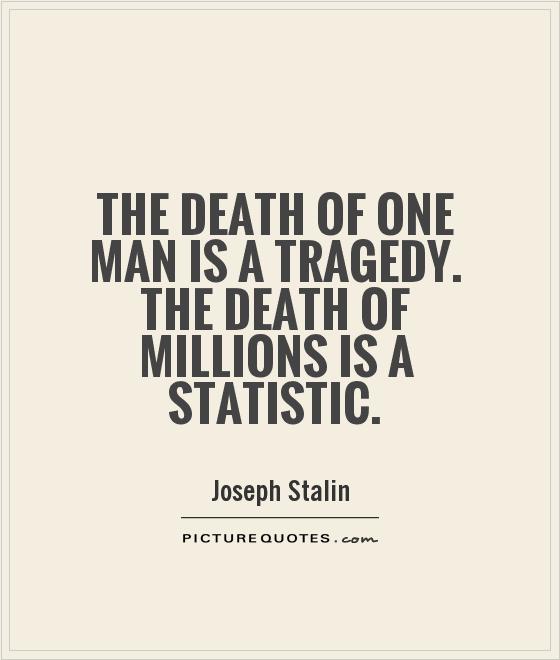The death of one man is a tragedy. The death of millions is a statistic

The death of one man is a tragedy. The death of millions is a statistic
Joseph Stalin, the infamous Soviet dictator, is often quoted as saying, "The death of one man is a tragedy. The death of millions is a statistic." This chilling statement reflects the callous disregard for human life that characterized Stalin's rule and the brutal policies he implemented during his time in power.Stalin's words reveal a disturbing truth about the way in which totalitarian regimes view the value of human life. To Stalin, individual lives held little significance in comparison to the larger goals of the state. The deaths of millions of people under his rule were seen as necessary sacrifices in the pursuit of his vision of a communist utopia. In this worldview, the suffering and loss experienced by individuals were overshadowed by the perceived benefits to the collective whole.
Stalin's statement also highlights the dehumanizing effects of totalitarianism. By reducing the deaths of millions to a mere statistic, Stalin sought to minimize the impact of his policies on the lives of ordinary people. This callous indifference to human suffering allowed him to justify the atrocities committed under his rule and maintain his grip on power.
The legacy of Stalin's words continues to resonate today, serving as a stark reminder of the dangers of unchecked authoritarianism. The phrase has been used to illustrate the ways in which oppressive regimes can devalue human life and justify mass violence in the name of ideology. It serves as a cautionary tale about the dangers of concentrating power in the hands of a single individual and the importance of safeguarding the rights and dignity of all people.












 Friendship Quotes
Friendship Quotes Love Quotes
Love Quotes Life Quotes
Life Quotes Funny Quotes
Funny Quotes Motivational Quotes
Motivational Quotes Inspirational Quotes
Inspirational Quotes